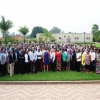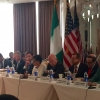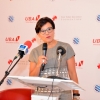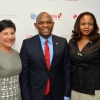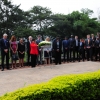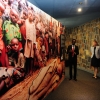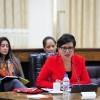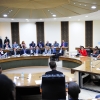Feb052016
Posted at 10:42 AM
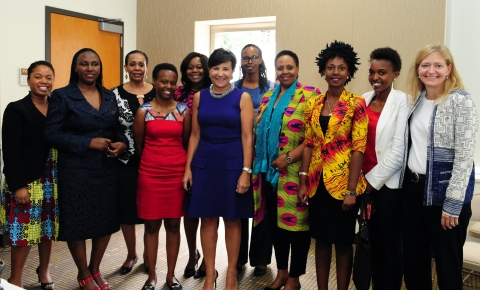
U.S. Secretary Pritzker completed her fact-finding mission to Africa with the President’s Advisory Council on Doing Business in Africa (PAC-DBIA) in Kigali, Rwanda. The goal of the trip for the PAC-DBIA members was to listen and learn, and in the near future, provide recommendations to President Obama and Secretary Pritzker that will guide the Administration’s policy choices with respect to enhancing commercial ties between the U.S. and countries across Africa. Secretary Pritzker and the Council also visited Nigeria from January 25-26 and Rwanda from January 27-28.
Rwanda is one of Africa’s economic success stories and a key partner within the East African Community (EAC). From 2000 to 2012, Rwanda’s economy grew at 8.1 percent per year. Furthermore, Rwanda has significantly improved its rankings in the World Banks’ Ease of Doing Business Index – Rwanda is ranked as 62nd out of 189 economies in the 2016 report and the second-best in Africa behind Mauritius. Less than a decade ago, Rwanda was ranked 143rd. The Council chose to visit Rwanda to gain a deeper understand of what Rwanda has done that has worked, and how the country's progress can serve as an example for others in the region and across the continent.
In Kigali, the group first visited the Gisozi Genocide Memorial, home to the remains of victims of the 1994 genocide, which has become a permanent memorial, museum, and archive. Secretary Pritzker had the opportunity to pay tribute to those lost in the genocide and recognize Rwanda’s progress in moving beyond the tragedy.
Secretary Pritzker then met with Rwanda President Paul Kagame, to discuss ways to deepen the commercial relationship with Rwanda and some of the challenges facing our two nations. Following their meeting , Secretary Pritzker and President Kagame were joined by the PAC-DBIA members and African business executives for a roundtable about the economic benefits of increasing regional trade and integration efforts among the countries of the East African Community (EAC). While the EAC is the most progressive trading region in Africa, it still faces many challenges in areas like transportation and energy infrastructure and customs modernization. Private sector investments from both U.S. and African businesses would not only help solve these issues, but would also create new opportunities for increased U.S.-African commercial ties.
To wrap-up the visit in Kigali, Secretary Pritzker and Ambassador Erica J. Barks-Ruggles hosted a roundtable with local businesswomen and gave the Council an opportunity to learn how they are contributing to the culture of entrepreneurship in the country. Rwanda is known for high rates of female participation in business and government, and members of the PAC-DBIA heard about the policies and programs – whether instituted by the Government of Rwanda or directly supported by the U.S. Embassy – that have created such opportunities for women. They also discussed the specific challenges entrepreneurs face, both as women and as business owners.
The Secretary's fact-finding mission to Nigeria and Rwanda underscores the Obama Administration's commitment to shifting the U.S. economic relationship with Africa from one based on aid to one based on trade and investment. During this trip, Secretary Pritzker also announced the second U.S.-Africa Business Forum, which will take place during the week of September 19, 2016, on the occasion of the 71st Session of the UN General Assembly. The first forum brought together hundreds of American and African CEOs with nearly every African head of state in an effort to spur more trade and investment between the United States and the 54 countries of Africa.


